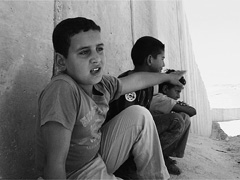| Special Invitation Films |
|---|
|
|
Out of Place
- JAPAN / 2005 / Japanese, English, Arabic, Hebrew / Color / 35mm (1:1.37) / 137 min
 Director: Sato Makoto
Director: Sato Makoto
Photography: Otsu Koshiro, Kurihara Akira, Sato Makoto
Editing: Hata Takeshi
Sound Editor: Tsurumaki Yutaka
Assistant Directors: Najib El-Khash, Yayama Kumiko, Ishida Yuko
Translator, Supervisor: Nakano Makiko
Production Manager: Sasaki Masaaki
Co-Producer: John Junkerman
Planning, Producer: Yamagami Tetsujiro
Production Company, World Sales: Siglo
Edward W. Said was actively involved in the Israeli-Palestinian issue as both a writer and an activist till the very end. Rather than deliberately clinging to notions of identity such as nationality, race or religion, he accepted his own existence as a Palestinian “exile” to be a “continuous current.” Based on that graceful, unyielding, perhaps even musical idea, he searched unceasingly for a path to reconciliation and co-existence. This film documents a journey exploring Said’s will and memory.
[Director’s Statement] In March 2004 I took it into my head to shoot a film on Edward W. Said, and went on my first trip to the Middle East to do location hunting. Following Said’s memories and recollections in Syria, Lebanon and Cairo, I made several visits to Palestinian refugee camps. The texts left behind by Said were the only compass for me, a complete outsider to the Middle Eastern world and the Palestinian problem. Yet these people and the chaotic, dazzling diversity of their life, appeared very fresh and appealing to me. On the other hand, I began to feel the urge to also try and touch upon the lives of the ordinary people in Israel, who, as long as you only look at things from the Arab side, merely appear as a violent wedge. With this, the film, by way of Edward W. Said, began to gently shift in the direction of touching upon the lives of people shaken by all types of borders.
Within the space of just one year, I visited the region three times from the Arab side, twice from the Israeli side, and met with truly a lot of people. Including those in New York, I listened to the stories of over thirty people concerned with Said. As I was visiting villages on the borderlines of Israel and the Arab countries, I began to think about how I could make the hidden borders visible. While continuously wondering what on earth I, not in the least acquainted with Said and a first time visitor to the Middle East, could possibly achieve, I was nonetheless moved by the rich diversity of the people I met. And, I believe with that, this film managed, be it only just, to find a place to land.
 Sato Makoto
Sato Makoto
Born 1957 in Aomori Prefecture, and raised in Tokyo, Sato Makoto discovered documentary film when he visited Minamata as a student, and worked on Katori Naotaka’s The Innocent Sea. While touring Japan with the film, he met people who lived by the Agano River in Niigata and decided to make a film about them. Living with seven crew members for three years, Living on the River Agano was completed in 1992, and won a number of awards including the Runner-up Prize at YIDFF ’93. Following this, he made several films for TV. His work Artists in Wonderland (1998) screened at Japanese Panorama YIDFF ’99. That year he was appointed head instructor at the Film School of Tokyo, and in 2001 became a professor at Kyoto University of Art and Design. At YIDFF 2001, he served as a juror for New Asian Currents and his films SELF AND OTHERS (2000) and Hanako (2001) were screened at that time. He spent one year living in London from August 2002 with support from the Agency for Cultural Affairs’ Overseas Study Program for Artists. Recent publications include The Horizons of Documentary Film—To Understand the World Critically (2001) and Dozing London (2004; all works published by Gaifusha). Memories of Agano will be screened in the YIDFF 2005 special program on personal documentary, “all about me?” |
